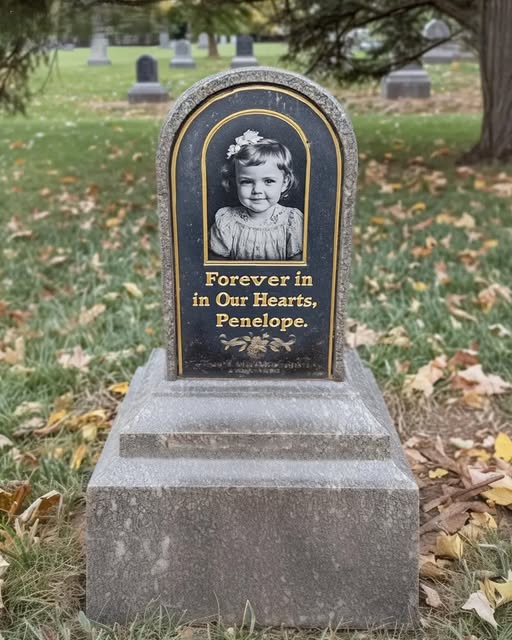I thought visiting Dad’s grave would bring me closure, but instead, I found something that sent chills down my spine—a headstone with my name on it. That eerie discovery unraveled a shocking truth about my mother, one I never could have imagined.
It has been two years since cancer took my father—two years, four days, and what feels like an eternity of grief.
I still remember the moment we got his diagnosis: stage IV lung cancer. Time seemed to stop, trapping us in a nightmare with no escape. Despite immediate treatment, deep down, we all knew the outcome was inevitable. Dad fought hard, but in the end, cancer won.
Mom broke the news over the phone while I was at home in the city. Her voice, always steady, trembled as she spoke.
“Penny… he’s gone.”
Everything after that was a blur—tears, hurried packing, and Andrew, my husband, driving us to Mom’s house. I kept expecting Dad to be there, standing at the door with open arms. But he never would be again.
At the funeral, I felt disconnected, as if I were outside myself, watching my own grief unfold as the casket was lowered. It felt like I was burying a piece of myself with him.
They say time heals, but two years later, the pain is just as raw. At first, I could barely function. Nights were spent crying myself to sleep, clinging to memories—Dad teaching me to ride a bike, sneaking me extra ice cream, beaming with pride at my graduation.
I drowned myself in work, avoiding the town and its painful reminders. Mom started visiting me instead, and I let myself believe that was enough. But recently, guilt crept in. I knew I had to go back, to face what I had been running from.
Last week, Andrew and I made the drive home. My anxiety built with every familiar landmark that came into view.
Our first stop was the cemetery. Every step toward Dad’s grave felt heavier than the last. When I finally reached it, my legs gave out. Kneeling, I traced his name on the cold stone, my tears falling freely. I was so lost in my grief that Andrew’s voice startled me.
“Penny, look over there,” he said, his tone uneasy.
I turned—and my blood ran cold.
A few yards away, another headstone bore my name: Forever in Our Hearts, Penelope. Beneath it was a photo of me as a child, smiling innocently. I stared, my breath catching. This wasn’t a dream. The grave was real.
My hands shook as I called Mom. She answered immediately.
“Mom,” I began, my voice unsteady, “I’m at the cemetery. There’s a grave here… with my name on it. What is this?”
A long silence. Then, her eerily calm voice:
“I didn’t think you’d ever come back to see it.”
“What are you talking about?” I demanded.
“After your father died, I felt like I lost you too,” she admitted. “You stopped coming home, barely called… I needed something to grieve.” A pause. “So, I bought the plot next to your father’s and had the headstone made. It was the only way I could cope.”
Shock gave way to heartbreak. But something still didn’t make sense. Why hadn’t she mentioned this? Why pretend everything was normal?
Then I remembered—her insistence on my health, the herbal teas, the vitamins she sent me. And the pills.
A cold realization settled in my gut.
“Mom,” I said, my voice firm. “I’m coming over.”
The drive to her house felt different this time. Streets once filled with childhood nostalgia now carried an air of unease.
When we arrived, Mom greeted me with a serene smile, as if she had been expecting us. Inside, the house looked the same—except for one thing.
A small shrine.
Candles flickered beside a framed photo of me, surrounded by fresh flowers. My stomach twisted.
“Mom, this has to stop,” I said, my voice shaking. “Why did you do this?”
She looked at me with a sad smile. “I couldn’t bear to lose you like I lost your father. I had to keep you close… any way I could.”
This wasn’t just grief. It was something much darker. I knew she wouldn’t let go unless I helped her.
I suggested she move closer to us, so we could see each other every day. She hesitated but finally agreed. A week later, I stood at the cemetery, watching workers remove the headstone bearing my name. Together, Mom and I dismantled the shrine.
The transition hasn’t been easy, but visiting Dad’s grave that day changed everything. It revealed the twisted reality Mom had been living in, and now, for the first time in years, we’re on the path to healing.
Dad’s memory will always be with us—but instead of being a weight of sorrow, it’s becoming a source of strength.
